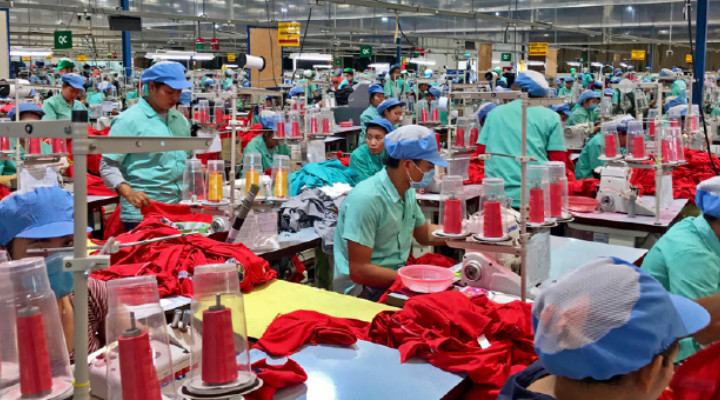According to new research by The Business & Human Rights Resource Centre in the UK, the right to freedom of association and collective bargaining is under attack in major garment producing countries in Asia, and it is leading to an increase in worker exploitation. The centre interviewed 24 trade union leaders and surveyed 124 union activists and labour advocates in Bangladesh, Cambodia, India, Indonesia and Sri Lanka, with nearly 61 per cent of survey respondents reporting the situation has
as gotten worse since the pandemic.
Allegations of union-busting and related abuse at 13 factories were revealed through the interviews for this report.
These factories supply, or have recently supplied, at least 15 global fashion brands and retailers, including Adidas, Asda, Benetton Group, Bestseller, C&A, Sainsbury’s, Etam, H&M, Hugo Boss, J.Crew, OVS SpA, Mango, Next, Primark and Under Armour.
The abuses
Forty-eight per cent of respondents revealed an increase in discrimination, intimidation, threats and harassment of trade union members by factory management.
Thirty per cent of survey respondents reported an increase in gender-based violence and harassment as a result of the restrictions on trade union rights.
An increase in wage and severance theft as a result of trade union restrictions was reported by 58 per cent of survey respondents, while 27 per cent reported an increase in violence against trade union leaders.
Despite brands making policy commitments to support freedom of association across their supply chains, with some even signing Global Framework Agreements with union federations, there remains a huge gap between policy and practice.
This has left many fashion brands complicit in restrictions on freedom of association and resulting abuses.
The bigger picture
“Violation of freedom of association and the right to collectively bargain has plagued the fashion industry’s supply chains for decades,” Natalie Swan, a labour rights project manager at The Business & Human Rights Resource Centre, told Inside Retail.
According to her, the pandemic exacerbated the issue, and the increased suppression of trade union rights that was seen during the early days of the pandemic is now becoming the norm.
“Factories continue to use the pandemic as a reason to prevent trade union formation and to suspend collective bargaining, bargaining agreements and even collective bargaining negotiations,” she said.
This has had a devastating knock-on effect on garment workers. Without a collective voice and protection, workers face declining wages, longer working hours and increased abuse and harassment on the factory floor.
Where do we go from here?
Swan believes brands need to step up and ensure that their own human rights and sourcing policies are actually being implemented on the ground.
She feels that brands must engage directly and meaningfully with unions and worker groups as part of their due diligence, and when reports of union busting arise in their supply chains, they must work with them to support adequate and timely remedy.
“This engagement with unions is particularly important during times of crises, such as during the pandemic or the ongoing economic crisis, which make it difficult for unions to operate as they normally would,” she stressed.
According to her, brands must ensure freedom of association is not the first thing to fall off the agenda during these times.
“Freedom of association plays a vital role in ensuring stability for workers, but also for the brands who are heavily dependent on these workers,” Swan said.
Ultimately, If the apparel industry is to create shared prosperity and security during uncertain economic times, brands, suppliers and governments should act urgently to ensure freedom of association and collective bargaining rights remain at the top of the agenda.
Stand up and be counted
Voluntary standards to ensure brands respect freedom of association across their supply chains are failing, as evidenced from the research conducted by the Centre.
Swan believes that there is an urgent need for legal consequences for brands which fail to truly commit to these core fundamental rights, which are essential for the exercise of other human rights.
“It is time for legally binding standards and enforcement mechanisms which can be used by workers and unions to hold brands and suppliers accountable for labour and human rights violations,” she elaborated.
Alongside initiatives for binding accountability, brands also need to ensure their purchasing practices allow suppliers to pay workers a fair living wage.
“They must start seeing improvements in workers’ terms and conditions as a sign of a healthy business model, rather than something threatening their profits,” she said.
The endgame
While governments are committing to core International Labour Organisation (ILO) conventions on an international stage, Swan is not seeing these benefits translated domestically.
“There needs to be an enabling legislative environment whereby international commitments to human rights and freedom of association are strengthened through legislation. Importantly, this must be financed and enforced,” she said.
The Centre’s research shows how suppression of trade union activities can pave the way for the rise of garment worker exploitation.
“This is likely to become the status quo, with abuses such as these rising, if no action is taken to reverse this curb on freedom of association,” she warned.

